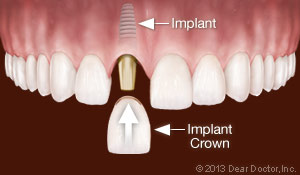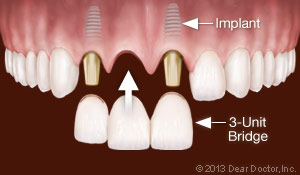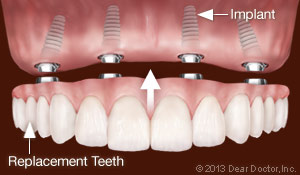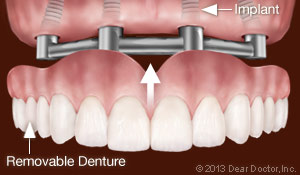Dental Implants

If you have lost one or more natural teeth, the best solution for you may be dental implants. Dental implants are strong and long-lasting, giving you a solution that will let you eat, talk, and smile with ease for decades to come.
A dental implant is a titanium post that is shaped like a small screw. Your dentist, periodontist, or oral surgeon will place the metal post in the bone under your gums. Your bone will gradually grow around the implant and then a natural-looking replacement tooth will be attached to the metal post. Dental implants can also be used to secure a crown, bridge, or fixed dentures.
Implants have a documented success rate of over 95%, which is significantly higher than any other tooth-replacement option.
Tooth Replacement Options Using Dental Implants
Implants can be used in a variety of ways to replace missing teeth:
Single Tooth Replacement: When you have one tooth missing, a single implant is inserted into the bone to replace the root part; a custom-made, color-matched, stain-resistant crown is then placed on top to mimic an actual tooth. This treatment choice has the highest success rate, making it the best long-term investment for replacing a single missing tooth – even if the initial cost is slightly higher than other options. An implant will never decay or need root canal treatment, and feels just like a natural tooth.
Multiple Tooth Replacement: When you have more than one tooth missing, you don’t need to replace each one with an implant. Instead, implant teeth can act as supports for fixed bridgework. For example, if you are missing three teeth in a row, we can place two implants, one on either side of the gap, and a crown in between that has no implant underneath. The advantage to this method is that you don’t need to rely on natural teeth to serve as the supports for the bridge. When natural teeth are used as abutments for fixed bridgework, they can become weakened and subject to tooth decay and root canal problems, something you’ll never have to worry about with dental implants.
Fixed Implant-Supported Dentures: Implants can support an entire row of upper or lower replacement teeth that are fixed in the mouth and never removed. Sometimes, the replacement teeth can be supported by just four implants. If the jaw bone has deteriorated, more implants may be needed to support a row of 10 to 12 teeth. Dental implant-secured replacement teeth protect your jaw bone, won’t slip, and should last a lifetime.
Implant-Supported Removable Dentures: Have you lost all of your top or bottom teeth? You may notice that your denture doesn’t fit as snugly as you like. Implants can make dentures more comfortable to wear so you can eat and talk with confidence. Here’s what happens with traditional dentures: since you no longer have tooth roots, your jaw bone recedes, eroding the bone ridges that support your dentures. Receding bone will most likely impact your appearance. As your jaw bone recedes over time, your face will begin to sag, making you appear older. By placing implants in the top or bottom jaw, over which the removable denture can attach, we transfer pressure away, preserving the bone ridge. The stability provided by the implants also prevents the tongue from easily displacing the lower denture. Implant-secured dentures also reduce or eliminate the need for denture adhesives.
Dental Implant Restorations
A dental implant restoration refers to the replacement tooth that is placed on top of the dental implant titanium post. The restoration may be a crown, a bridge, or a denture.
Dental implants can help your smile in many ways. Ask us how they can help you. We’ll be happy to answer any questions you have.
Frequently Asked Questions About Dental Implants
- What are dental implants?
- How many teeth can be replaced with dental implants?
- Is dental implant surgery painful?
- Are dental implants expensive?
- How do you care for dental implants?
- Can my body reject a dental implant?
- Am I a candidate for dental implants?
Dental implants are small titanium posts that replace the roots of missing teeth ( View Example ). They are inserted into your jawbone during a minor surgical procedure that takes place in the dental office. After the implant has been placed in your jawbone, a completely lifelike porcelain tooth crown is attached. In some cases, the implant needs to fuse with the bone for several months before it is permanently crowned; in other cases, you can have new (but temporary) teeth the same day your implants are placed.
You can replace a single tooth, multiple teeth or all your teeth with implants ( View Examples ). You don't even need one implant for every missing tooth. As few as two implants can support a removable lower denture, while as few as four implants can provide a full, permanent set of top or bottom teeth.
Most people find dental implant surgery very easy to tolerate. Any post-operative discomfort can usually be managed with over-the-counter anti-inflammatory medication such as ibuprofen or OTC pain-relievers. Ice can also be helpful.
At the outset, implants are more expensive than other tooth-replacement methods such as dentures or bridgework. But they also last many years longer and in fact should never need replacement. So they offer the best, most cost-effective option when viewed as a long-term investment in your health, comfort and well-being.
They require exactly the same care as natural teeth: daily brushing and flossing, along with regular dental checkups and professional cleanings. Although implant teeth will never decay, the gum tissues around them can become inflamed or infected in the absence of good oral hygiene. Properly cared-for dental implants should last a lifetime.
Strictly speaking, implants can't be rejected because they contain no living cells or genetically coded material. The titanium of which they are made is completely biocompatible, and allergies are extremely rare. But an implant can fail to integrate with the jawbone if an infection develops in the absence of good oral hygiene, or if it is subjected to biting forces too soon. However, this is rare; implants regularly achieve success rates in excess of 95%.
There's a good chance that you are, but this can only be determined after a complete oral examination that includes x-rays of your jaws. Please schedule a consultation to begin the exciting process of restoring your smile and bite.



